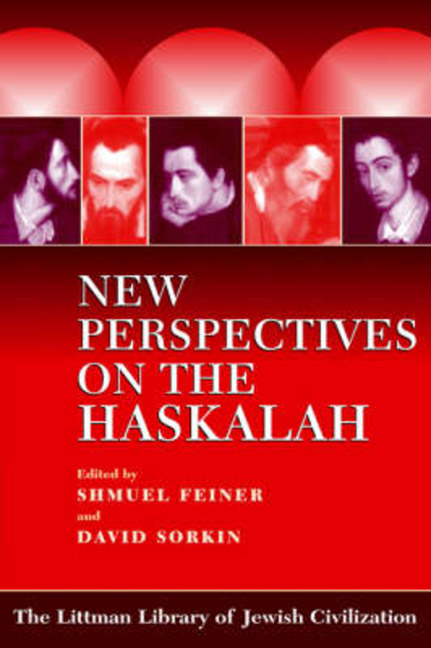Book contents
- Frontmatter
- Preface
- Contents
- Note on Transliteration
- Introduction
- 1 The Early Haskalah
- 2 Naphtali Herz Wessely and the Cultural Dislocations of an Eighteenth-Century Maskil
- 3 Enlightenment Values, Jewish Ethics: The Haskalah's Transformation of the Traditional Musar Genre
- 4 Was there a ‘Haskalah’ in England? Reconsidering an Old Question
- 5 Strategy and Ruse in the Haskalah of Mendel Lefin of Satanow
- 6 The Struggle of the Mitnagedim and Maskilim against Hasidism: Rabbi Jacob Emden and Judah Leib Mieses
- 7 Magic and Miracle-Workers in the Literature of the Haskalah
- 8 Portrait of the Maskil as a Young Man
- 9 Reality and its Refraction in Descriptions of Women in Haskalah Fiction
- 10 Enlightened Rabbis as Reformers in Russian Jewish Society
- 11 Towards a Historical Definition of the Haskalah
- Glossary
- Notes on Contributors
- Bibliography
- Index
5 - Strategy and Ruse in the Haskalah of Mendel Lefin of Satanow
- Frontmatter
- Preface
- Contents
- Note on Transliteration
- Introduction
- 1 The Early Haskalah
- 2 Naphtali Herz Wessely and the Cultural Dislocations of an Eighteenth-Century Maskil
- 3 Enlightenment Values, Jewish Ethics: The Haskalah's Transformation of the Traditional Musar Genre
- 4 Was there a ‘Haskalah’ in England? Reconsidering an Old Question
- 5 Strategy and Ruse in the Haskalah of Mendel Lefin of Satanow
- 6 The Struggle of the Mitnagedim and Maskilim against Hasidism: Rabbi Jacob Emden and Judah Leib Mieses
- 7 Magic and Miracle-Workers in the Literature of the Haskalah
- 8 Portrait of the Maskil as a Young Man
- 9 Reality and its Refraction in Descriptions of Women in Haskalah Fiction
- 10 Enlightened Rabbis as Reformers in Russian Jewish Society
- 11 Towards a Historical Definition of the Haskalah
- Glossary
- Notes on Contributors
- Bibliography
- Index
Summary
STANDARD historiography depicts Mendel Lefin of Satanow (1749–1826), the east European maskil who spent time in Berlin among Mendelssohn's circle in the 1780s and returned to Poland and Galicia to spread the message of the Haskalah, as a populist. Born in Satanow, Podolia in 1749, Lefin lived in Berlin from 1780 to 1784, then returned to Poland, where he settled in Mikolajow, Podolia, and participated in the debates of the last Polish parliament (the Four Year Sejm of 1788–92). In the first decade of the nineteenth century he lived in Russia on the estate of Joshua Zeitlin, the generous patron of many east European maskilim; at the end of his long life, he moved to Austrian Galicia, living first in Brody (1808–17) and then in Tarnopol, where he died in 1826. Prolific from the 1790s until his death, Lefin penned works which cover a broad spectrum of maskilic concerns: biblical translations (into Yiddish), philosophical speculations, programmes for the moral and cultural reform of the Jewish community, dissemination of medical and scientific information, and translations of German literature.
Implicit in the image of Lefin as a populist is the view that his Haskalah, or programme for enlightening the Jews of eastern Europe, was ‘nationalist’ in that it was directed towards the Jewish masses. N. M. Gelber, for example, concluded that ‘his books were widely dissiminated; they reached a broad audience and had a great “cultural-national” impact on the Jewish community’, and depicted Lefin himself as one who ‘endeavored that the circle of enlightened Jews in Brody should not be isolated from the people, but rather they should be intimately connected to the everyday life of the masses’. Historians such as Raphael Mahler and Israel Weinlös contrasted Lefin to Herz Homberg (1749–1841), the German maskil who as supervisor of Joseph II's schools in Galicia was viewed with deep suspicion by east European Jewry, and to other Berlin maskilim whom they believed to be antinationalist and assimilationist. They saw ‘explicit democratic justifications’ in Lefin's utilitarian use of Yiddish to disseminate the ideas of the Haskalah. Lefin, Weinlös wrote, ‘tried to approach the masses and to be endeared to them. He loved his people, the simple people, [with] a real love and, in contradistinction to [Homberg], he was one of the first to “descend” towards this people to speak with it in its language [Yiddish] and in its spirit.’
- Type
- Chapter
- Information
- New Perspectives on the Haskalah , pp. 86 - 102Publisher: Liverpool University PressPrint publication year: 2001

